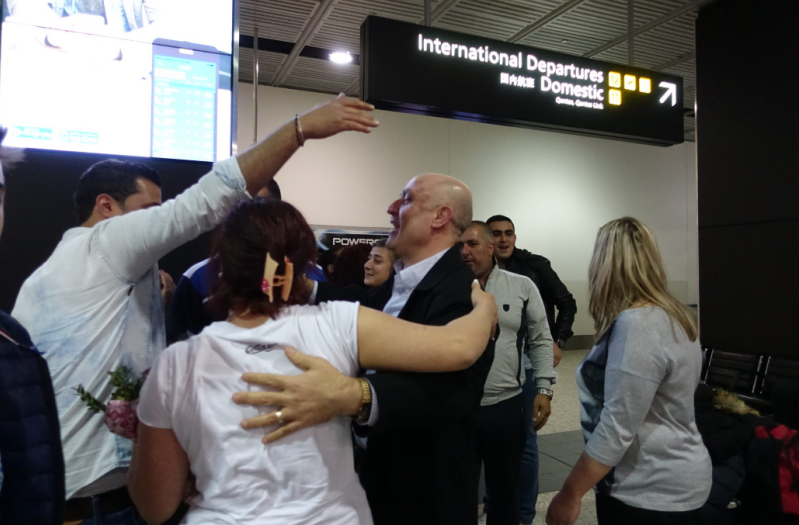
Jude Simion, originally from Sri Lanka, is a member of the Refugee Highway Partnership global leadership team and heads-up a refugee support charity called Philoi Global based in Sydney, Australia. In an exclusive interview, Simion says innovative solutions are urgently needed to address escalating challenges endured by migrating Christians. He said that the West could no longer be relied upon as the primary option for millions of refugees needing a resettlement, deeming the idea unrealistic.
Jude Simion grew up during the civil war in Sri Lanka and migrated to Australia in 2007, where he founded Philoi Global to support refugees, working in 11 countries to date and helping at least 2,000 individuals.
“Philoi” means “friend” in Greek and reflects Simion’s vision to walk in friendship with forcibly displaced Christians and minority groups. He is particularly concerned about finding solutions to accommodating forcibly displaced people.
Simion defines resettlement as helping these individuals move to a permanent country; rather than relocation, which means moving them to a safer location that is not necessarily permanent.
“We are looking at where we can support people, where they can find safe locations to study, work and thrive,” Simion says. “That’s where we are concentrating, not only looking at the traditional method of resettling them in the Western world because it’s not sustainable.”
Simion points out that for some Christians fleeing countries such as Afghanistan or Iran, there were few options to live in a neighboring country because of persecution. The preference is a “final destination where you can be settled” but he opines that international bodies such as the United Nations High Commissioner for Refugees downplay these risks.
Simion points to latest United Nations figures showing 2.4 million needing resettlement this year, 2024. However, he says that only 100,000 people were resettled in a third country last year. Using that scenario as a projection calculation, it would take 24-plus years to resettle all of this year’s vulnerable peoples. Therefore resettlement under the current scenario is not a sustainable solution.
Simion also says that large secular global agencies often overlook the presence of local churches as gateways to providing help for refugees.
“When people are displaced, the church goes with them or when people arrive at a destination, there is a church to host them. And often their capacity is very limited and the host or displaced church needs support.
“Our focus is to work with those churches, building their capacity and helping them. Aid agencies will come but after a crisis period is over, they leave, but the church remains with the people.”
Simion and his team work with refugee churches hosting forcibly displaced people, such as the Afghan underground church in India and Pakistan, “consulting, connecting, facilitating support for them.”
“They go under the radar but that also makes their life difficult and miserable because the Home Office of the U.K. or the Department for Foreign Affairs and Trade (DFAT) in Australia will simply come and say that there are no Christians among Afghans.
“But for security reasons, [the Afghan Christians] don’t tell where they are and the composition of the community. It’s only in the South Asian context, outside Afghanistan, that we can responsibly say there are nearly 2,000 Afghan Christians displaced in the subcontinent, and that includes Pakistan and India, which are two major countries where Afghan Christians are scattered.”
Building the capacity of local churches helps them to integrate such displaced people. However, there remains a challenge of “cultural ghettos” in Christian communities. Simion cites Australia as an example where churches need to better engage with refugees and migrants, helping them with cultural transition.
“We create either ethnic congregations, or we create so-called multiculturalism, as a silos approach, not really creating the space for people to integrate and be part of the society. It goes to the other extreme of saying people need to assimilate. You have come to this country. You need to live like us. There’s a big difference between integrating and assimilating.”
That is why Philoi Global is working with Australian churches to help them understand the cultural issues for refugees arriving in the country. This work is being replicated under the Churches in Cultural Transition project created by Philoi Global in other countries such as New Zealand, Brazil and Canada.
“We want to see how we can do things differently,” says Simion. “And there are possibilities in the resettlement space.”
One of these possibilities is focusing on skilled refugee migration – helping churches to sponsor skilled refugees for permanent resettlement.
The charity is also looking at whether refugees fleeing to neighboring countries can utilize student visas legally to study, live and be safe for a transitional period.
Another innovation by Philoi Global is a learning management system, providing online and informal learning resources free-of-charge to refugees, and those who help them. All they need is a device and an internet connection.
Refugees need understanding that they bring skills, which can be utilized if helped with cultural transition. “We have this perception that a refugee coming to a country, this is the only job they could do. But they come with vast levels of experience and helping them to realize their dreams is one of the things we really need to do.”
The charity’s approach is to give a “hand-up” rather than a “hand-out”, by providing livelihood assistance for refugees in host countries. Simion points out that 99 percent of refugees get stuck in a second host country with nowhere to go. That requires a different way of thinking when it comes to church missions, “thinking outside the box of the traditional way of doing it.”
“The way we respond to them has to be different,” he says. “And so being in a displaced context becomes an opportunity for the church to reach out to them. And that is the difference we fail to see most of the time. The displacement becomes an opportunity and our neighborhood and communities become a mission ground.”
Handouts are needed from churches to help refugees in the initial stages of resettlement but “if I summarize it," says Simion, "I would say there needs to be a tailor made approach by churches to refugee settlement, not having a cookie cutter approach that this is the only thing we provide. Refugee needs are diverse.”





